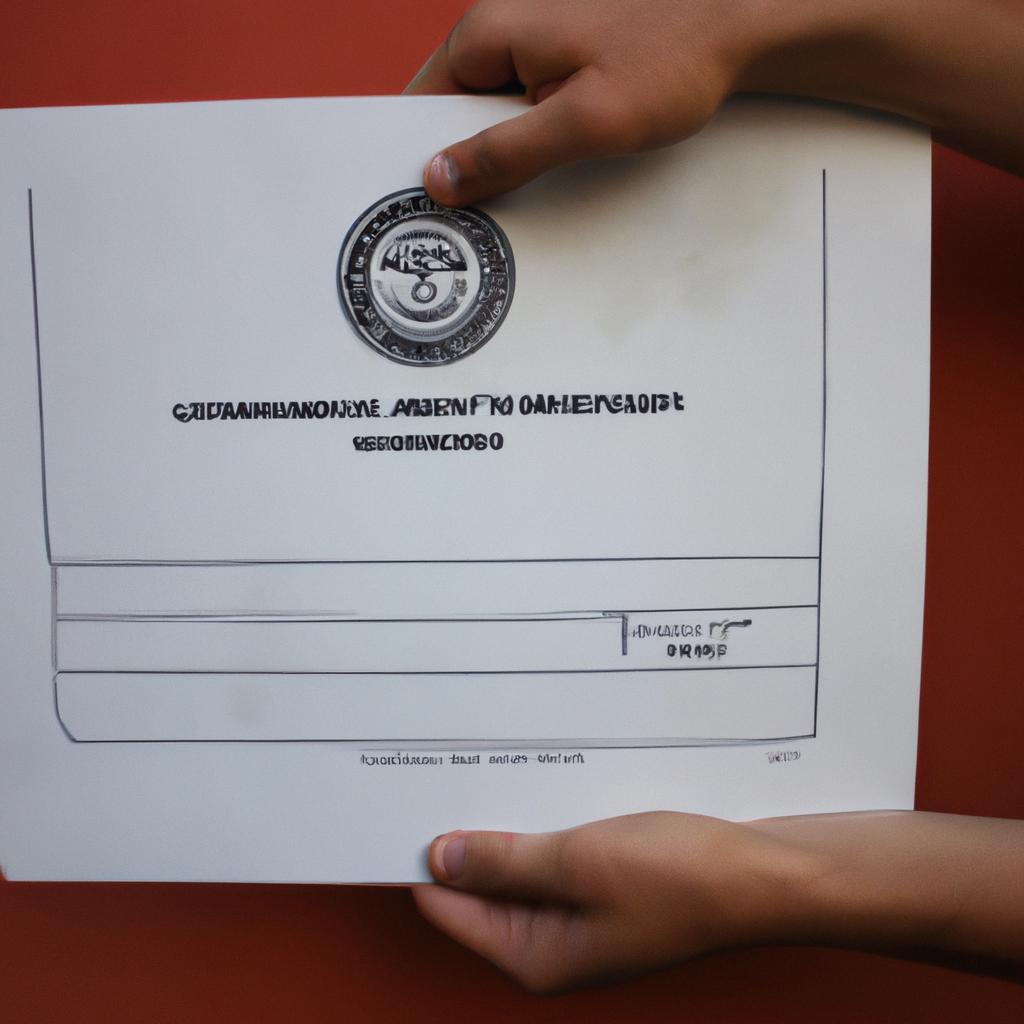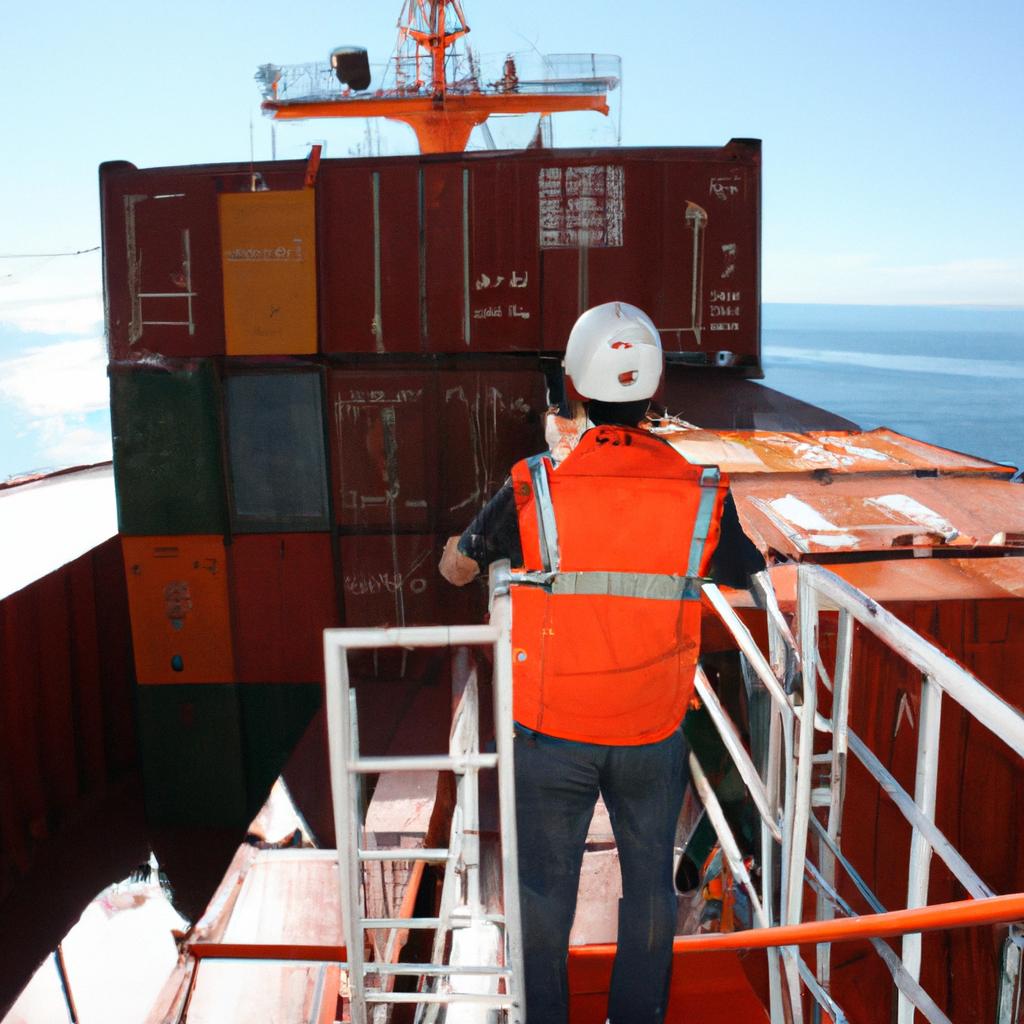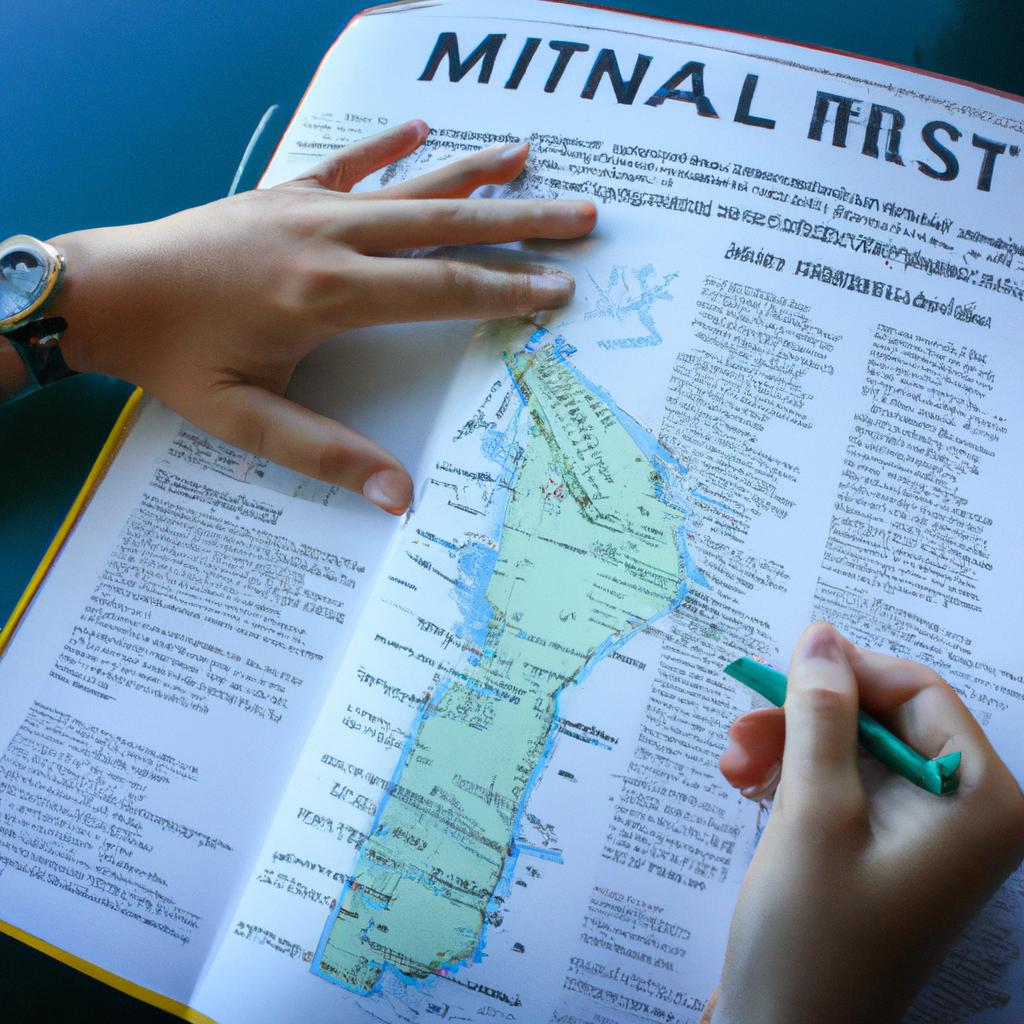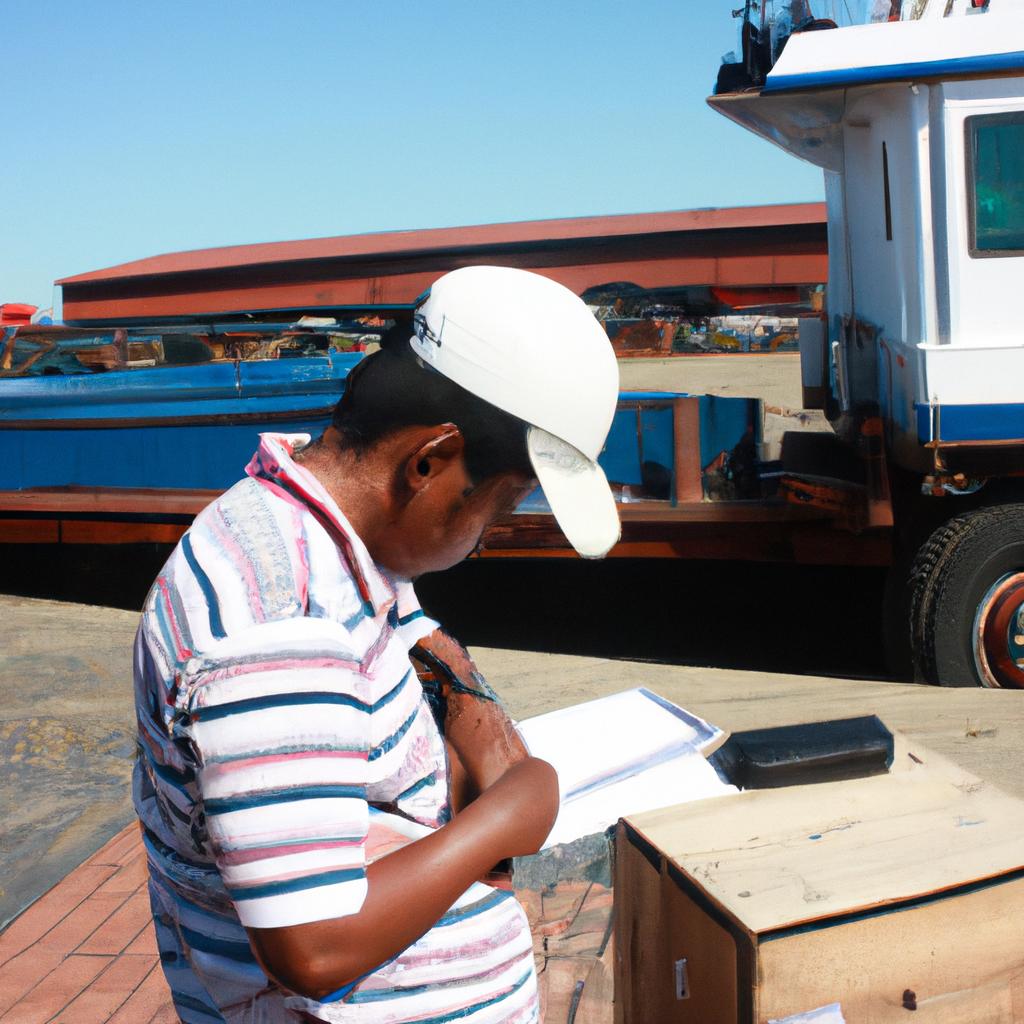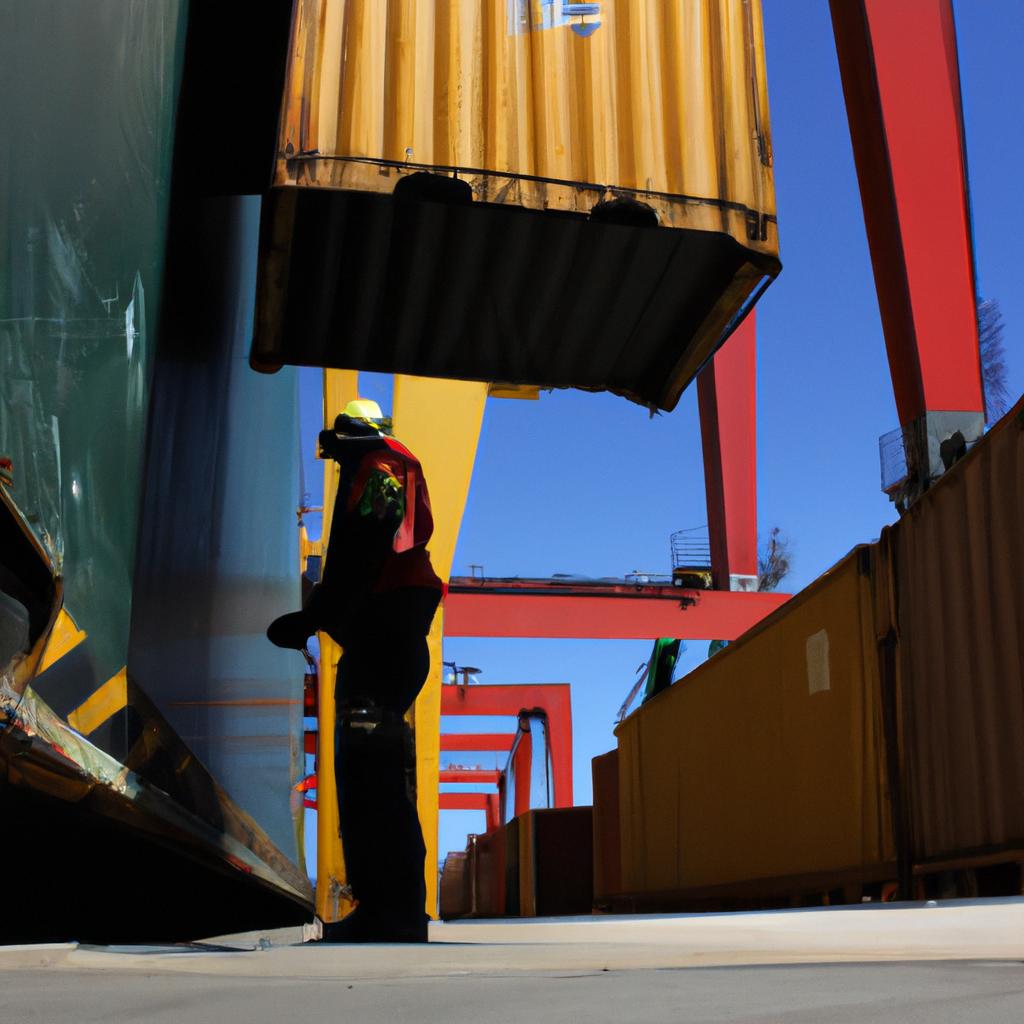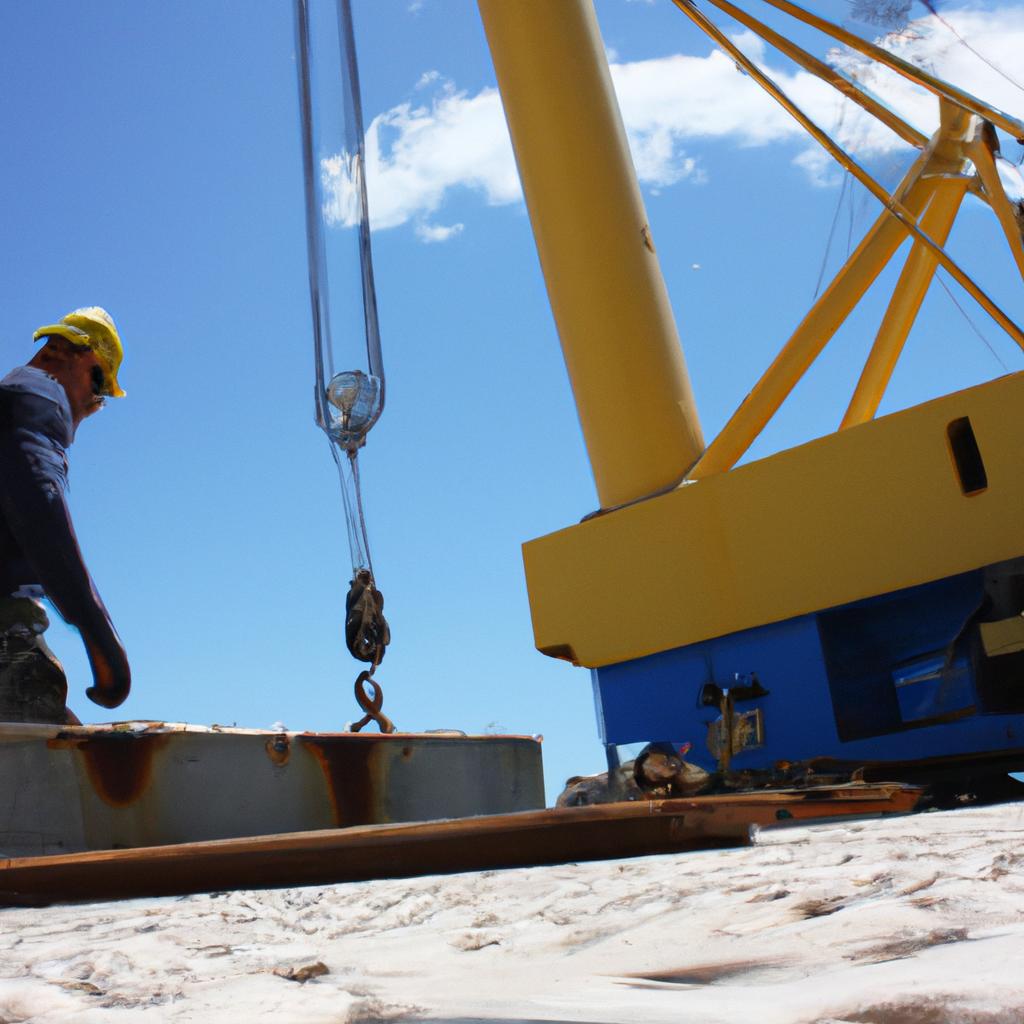Crew certification plays a pivotal role in ensuring the safety and efficiency of maritime operations. This article delves into the regulations governing crew certification in the Black Sea, focusing on transport and maritime sectors. By examining these regulations, we aim to shed light on the importance of standardized certifications for crew members, as well as highlight potential challenges faced by both shipowners and regulatory bodies.
Consider the case of a hypothetical shipping company operating in the Black Sea region that recently encountered an incident due to inadequate crew certification. The vessel experienced engine failure during adverse weather conditions, leading to delays in cargo delivery and financial losses for both the shipowner and clients. Such incidents underscore the significance of robust crew certification systems that prioritize compliance with international standards and ensure competent personnel are manning vessels navigating through challenging waters like those found in the Black Sea. As we delve further into this topic, it becomes evident that understanding the intricacies of crew certification is vital for maintaining safe and efficient maritime operations in this region.
Overview of Crew Certification
Imagine a scenario where a cargo ship, carrying valuable goods and manned by an experienced crew, encounters treacherous weather conditions in the Black Sea. As the vessel battles against towering waves and powerful winds, the crew’s ability to navigate safely becomes crucial for both their own survival and the preservation of the cargo onboard. This example highlights the importance of crew certification in ensuring maritime safety and regulatory compliance.
To comprehend the significance of crew certification in Black Sea transport, it is essential to consider several key factors:
- Competence: Crew members must possess adequate knowledge, skills, and experience to efficiently handle various situations that may arise during sea voyages. The attainment of appropriate certifications serves as evidence that individuals have undergone proper training programs and possess the necessary expertise to carry out their duties effectively.
- Safety: The unpredictable nature of marine environments necessitates stringent safety regulations. Crew certification ensures that seafarers are well-informed about emergency procedures, firefighting techniques, life-saving equipment operation, and other critical aspects related to safeguarding human lives at sea.
- Environmental Protection: With increasing concerns about environmental sustainability, certifying crews on ecological practices has become imperative in modern shipping operations. By promoting awareness regarding waste management protocols, pollution prevention strategies, and adherence to international standards such as MARPOL (International Convention for the Prevention of Pollution from Ships), certified personnel contribute significantly to preserving fragile marine ecosystems.
- Legal Compliance: Meeting legal requirements is paramount when operating within any jurisdiction. In Black Sea transport specifically, vessels must adhere to established maritime regulations outlined by governing bodies such as the International Maritime Organization (IMO) or regional authorities like those set forth by countries surrounding the Black Sea. Crew certification plays a vital role in guaranteeing compliance with these rules and avoiding potential penalties or legal repercussions.
In light of these considerations, it is evident that crew certification forms an integral part of maintaining safety standards and operational efficiency in Black Sea transport. The subsequent section will delve deeper into the specific reasons why crew certification holds such importance in this particular maritime region.
Importance of Crew Certification in Black Sea Transport
[Transition Sentence] Understanding the significance of crew certification is crucial, particularly when it comes to navigating the unique challenges posed by the Black Sea’s transportation sector.
Importance of Crew Certification in Black Sea Transport
Crew Certification: Black Sea Transport & Maritime Regulations
Overview of Crew Certification
In the previous section, we discussed the importance of crew certification in ensuring safe and efficient operations in Black Sea transport. Now, let’s delve deeper into the specifics of crew certification and explore its various aspects.
To illustrate the significance of crew certification, consider a hypothetical scenario where a cargo ship encounters adverse weather conditions while navigating through the Black Sea. The captain relies on the expertise of the crew to handle the challenging situation effectively. In this case, having certified crew members with specialized training in storm navigation becomes crucial to ensure the safety of both the vessel and its occupants.
Understanding crew certification involves familiarizing ourselves with several key factors:
-
International Standards: Crew certification follows internationally recognized standards set by organizations such as the International Maritime Organization (IMO). These standards establish minimum requirements for qualifications, competencies, and experience levels that crews must meet to operate vessels safely.
-
Training Programs: Various training programs are available to provide aspiring seafarers with essential skills and knowledge required for their respective roles onboard ships. These programs cover areas like maritime regulations, emergency response procedures, navigational techniques, firefighting, first aid, and more.
-
Certification Process: To obtain crew certifications, individuals must complete specific educational courses or training programs approved by relevant authorities. Once they have fulfilled all necessary requirements and passed examinations or assessments successfully, they can receive certificates validating their competence for specific positions within a ship’s crew hierarchy.
-
Periodic Renewal: Certifications usually have an expiration period requiring renewal at regular intervals. This practice ensures that crew members stay updated with evolving regulations and maintain their proficiency throughout their careers.
With these points in mind, it is evident that crew certification plays a fundamental role in enhancing maritime safety and efficiency across Black Sea transport operations.
Emotional bullet point list:
- Ensures well-trained personnel onboard
- Enhances passenger and crew safety
- Reduces the risk of accidents or incidents
- Improves overall operational efficiency
| Benefits of Crew Certification |
|---|
| Ensures well-trained personnel |
| Enhances passenger and crew safety |
| Reduces the risk of accidents or incidents |
| Improves overall operational efficiency |
Moving forward, let us now explore the requirements for crew certification in Black Sea transport.
Requirements for Crew Certification in Black Sea Transport
Previous section H2:’Importance of Crew Certification in Black Sea Transport’
Next section H2:’Requirements for Crew Certification in Black Sea Transport’
Having established the significance of crew certification in ensuring safe and efficient operations within Black Sea transport, it is essential to understand the specific requirements that govern this process. This section will delve into the various regulations and guidelines governing crew certification in the region.
To illustrate the importance of complying with crew certification requirements, let us consider a hypothetical scenario involving a cargo vessel operating in the Black Sea without proper certifications. The vessel encounters adverse weather conditions while transporting hazardous materials, resulting in an oil spill that threatens marine life and coastal communities. Such incidents emphasize why adherence to crew certification standards is crucial for safeguarding both human lives and environmental integrity.
The following bullet points outline key aspects of crew certification required by regulatory bodies responsible for overseeing maritime activities in the Black Sea:
- Validity Period: Certifications must be kept up-to-date through periodic renewals to ensure continuous compliance.
- Proficiency Levels: Different job roles on board require varying levels of proficiency, necessitating appropriate training and qualifications.
- Medical Fitness: All crew members are expected to meet certain health criteria to perform their duties safely and effectively.
- Language Skills: As effective communication plays a vital role in maritime operations, fluency or proficiency in English or other designated languages may be required.
Furthermore, understanding the specific certifications applicable to different positions onboard is crucial. The table below summarizes some common certifications necessary for personnel serving on vessels within Black Sea transport:
| Position | Required Certifications |
|---|---|
| Captain | Master Mariner Certificate |
| Chief Engineer | Chief Engineer Officer (CEO) Certificate |
| Radio Operator | Global Maritime Distress Safety System |
| General Operator’s Certificate (GOC) | |
| Able Seaman | Certificate of Proficiency in Survival Craft |
| and Rescue Boats |
By adhering to these requirements, ship operators can ensure that their crew members possess the necessary skills and qualifications to navigate safely within Black Sea waters. This not only mitigates potential risks but also enhances the overall efficiency of maritime operations.
Transition into subsequent section:
As we have explored the essential requirements for crew certification, it is now imperative to examine the training and educational programs available to support individuals in obtaining these certifications.
Training and Education for Crew Certification
Transitioning from the previous section on “Requirements for Crew Certification in Black Sea Transport,” it is essential to explore the training and education necessary to obtain crew certification. To illustrate the significance of this topic, let us consider a hypothetical scenario: imagine a newly recruited deck officer who lacks adequate knowledge about safety protocols onboard a vessel. This lack of training could potentially jeopardize not only their own well-being but also that of their fellow crew members and any passengers they may be responsible for.
To ensure the highest standards of safety and competence among crew members, several key aspects must be addressed during their training and education. These include:
- Maritime Law: Familiarity with maritime regulations specific to the Black Sea region is crucial. It encompasses understanding international conventions, local laws, and guidelines pertaining to various aspects of transport and navigation.
- Emergency Response: Comprehensive emergency response training equips crew members with critical skills needed to handle unforeseen circumstances at sea effectively. This includes fire-fighting techniques, first aid procedures, search and rescue operations, as well as crisis management strategies.
- Navigation Techniques: Proficiency in navigation techniques such as chart plotting, radar operation, electronic navigation systems (ECDIS), and meteorology enables crew members to navigate safely through complex waterways while adhering to relevant rules.
- Vessel Operations: A thorough understanding of vessel operations ensures that crew members can efficiently operate machinery, manage cargo handling processes, maintain proper stability, and execute routine maintenance tasks.
These four areas are just some examples of the comprehensive training required for crew certification in Black Sea transport. By focusing on these aspects during their education and training programs, aspiring seafarers can develop the necessary skills to carry out their duties responsibly while ensuring the safety of all stakeholders involved.
| Aspect | Importance | Training Required |
|---|---|---|
| Maritime Law | Ensures legal compliance | Classroom lectures, case studies |
| Emergency Response | Enhances safety measures | Simulated drills, practical exercises |
| Navigation Techniques | Facilitates safe navigation | Simulator-based training, on-board experience |
| Vessel Operations | Maintains operational efficiency | Hands-on tasks, supervised practice |
In the subsequent section, we will delve into the certification process for crew members. Understanding this process is vital as it outlines the specific steps and requirements individuals must fulfill to obtain their official certifications. By exploring these details, aspiring seafarers can better prepare themselves for a successful career in Black Sea transport.
[Certification Process for Crew Members]
Certification Process for Crew Members
Building upon the foundation of training and education, crew members seeking certification in the Black Sea region must undergo a meticulous process to ensure compliance with maritime regulations. Let us delve into the steps involved in obtaining crew certification in this area.
Certification Process for Crew Members:
To illustrate the significance of this process, let’s consider a hypothetical scenario involving a ship captain named Alexei who aspires to work on vessels traversing the Black Sea. Although highly experienced, Alexei needs to obtain proper certification to comply with regional regulations before embarking on his new endeavor.
The certification process entails several key steps:
- Verification of Credentials: Prospective crew members submit their credentials, including educational qualifications, previous experience, and necessary licenses or endorsements.
- Medical Examination: A thorough medical assessment is conducted to ensure that applicants meet the required physical standards for working at sea.
- Safety Training: Candidates are obliged to complete safety courses focused on topics such as firefighting techniques, emergency response procedures, personal survival skills, and first aid training.
- Regulatory Examinations: To evaluate candidates’ knowledge regarding maritime regulations specific to the Black Sea region, written examinations covering areas like navigation rules, pollution prevention measures, and vessel stability principles are administered.
Obtaining crew certification can be both challenging and rewarding. It involves:
- Demonstrating competence in various nautical skills while adhering to strict safety protocols.
- Undertaking rigorous training programs encompassing theoretical knowledge and practical expertise.
- Adapting to changing technological advancements within the maritime industry.
- Embracing an ongoing commitment to professional development.
Emotional Table:
| Challenges | Rewards | Skills Required |
|---|---|---|
| Meeting stringent standards | Enhanced job prospects | Navigational expertise |
| Adhering to safety protocols | Personal fulfillment | Emergency response |
| Continuous professional development | Financial stability | Effective communication |
| Staying updated on industry advancements | Global networking opportunities | Adaptability |
In summary, the certification process for crew members in the Black Sea region involves verifying credentials, undergoing medical examinations, completing safety training courses, and passing regulatory examinations. This meticulous process ensures that all certified crew members possess the necessary skills and knowledge required to operate safely within this maritime environment.
Ensuring Compliance with Crew Certification Standards, we will now explore how regulatory bodies monitor adherence to these certification standards without compromising maritime operations.
Ensuring Compliance with Crew Certification Standards
The certification process for crew members is a crucial step in ensuring the safety and efficiency of maritime operations in the Black Sea. By adhering to strict regulations, shipping companies can guarantee that their crews possess the necessary skills and knowledge to handle various challenges at sea. To exemplify the significance of this process, consider a hypothetical scenario where an uncertified crew member encounters a critical situation during navigation. Without proper training and certification, they may lack the expertise needed to respond effectively, potentially jeopardizing not only their own safety but also that of other crew members and passengers.
To ensure compliance with crew certification standards, several key elements must be considered:
-
Training Programs: Shipping companies should provide comprehensive training programs designed to equip crew members with essential technical skills, emergency response protocols, and industry-specific knowledge. These programs should cover topics such as navigation techniques, communication procedures, firefighting measures, first aid practices, and pollution prevention strategies.
-
Certification Requirements: The regulatory framework governing crew certification should outline specific requirements that individuals must meet to obtain relevant certifications. These requirements typically include minimum age limits, physical fitness criteria, proficiency in language skills (such as English), completion of approved training courses or programs accredited by recognized institutions or bodies.
-
Examination Processes: Rigorous examinations play a vital role in assessing the competence of aspiring crew members seeking certification. These exams evaluate theoretical knowledge as well as practical skills through simulations or assessments conducted under controlled conditions. They serve as objective benchmarks for determining whether candidates have attained the required level of proficiency.
-
Periodic Recertification: In addition to initial certification processes, regular recertification ensures ongoing competency maintenance among crew members. This periodic reassessment helps identify any gaps in knowledge or skill development while keeping up-to-date with advancements in technology or changes in regulations. It serves as a means of continuous improvement within the maritime industry.
Table: Importance of Crew Certification
| Benefits of Crew Certification |
|---|
| Enhanced safety at sea |
| Improved response to emergencies |
| Ensured compliance with regulations |
| Increased professionalism and competence |
In conclusion, the certification process for crew members is an essential aspect of ensuring maritime safety and compliance in the Black Sea. By establishing comprehensive training programs, defining clear certification requirements, conducting rigorous examinations, and implementing regular recertification processes, shipping companies can foster a culture of expertise and professionalism among their crews. This commitment to maintaining high standards ultimately contributes to enhanced safety measures, better emergency response capabilities, and increased confidence in the industry as a whole.
[References: International Maritime Organization (IMO), European Maritime Safety Agency (EMSA)]

